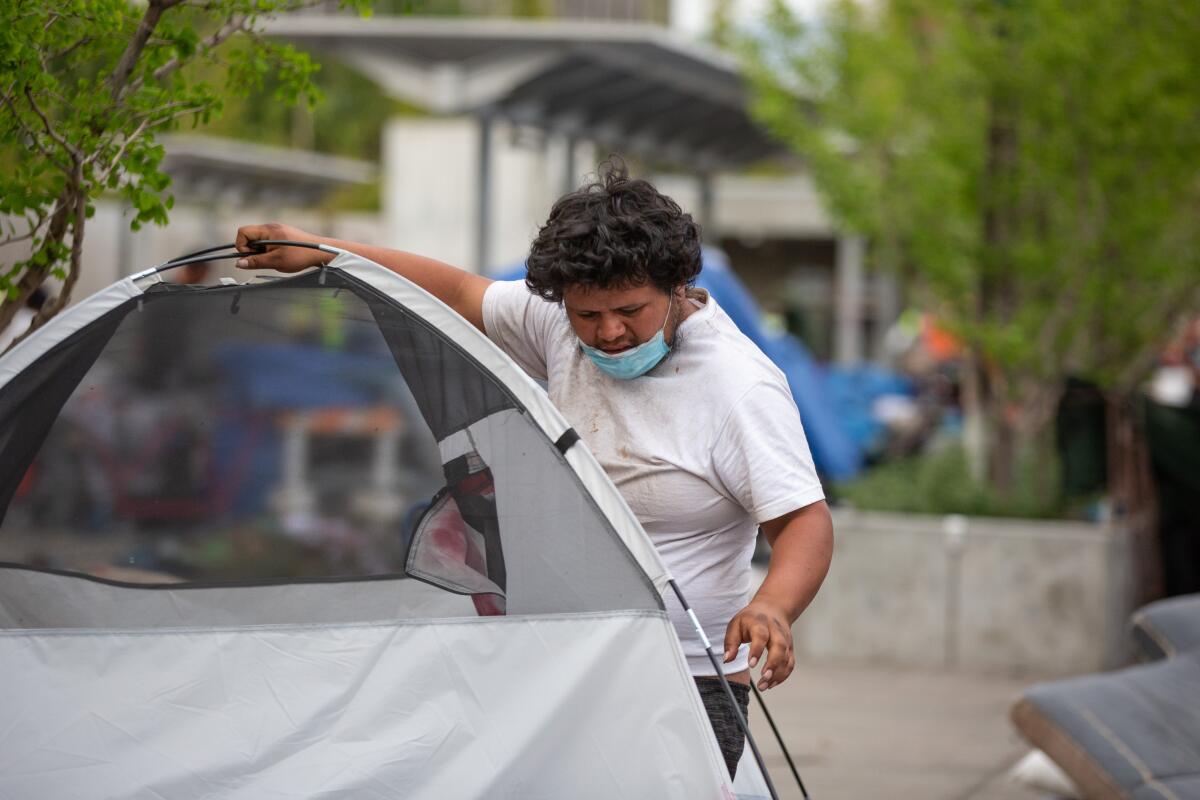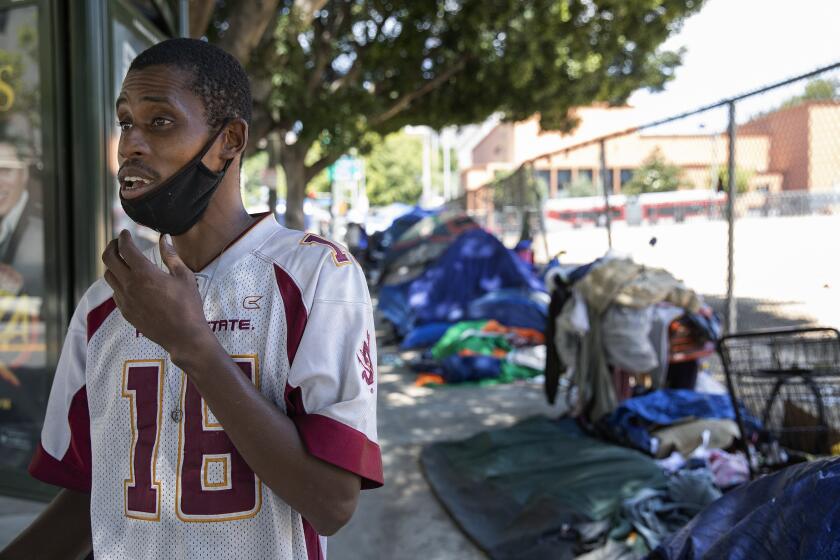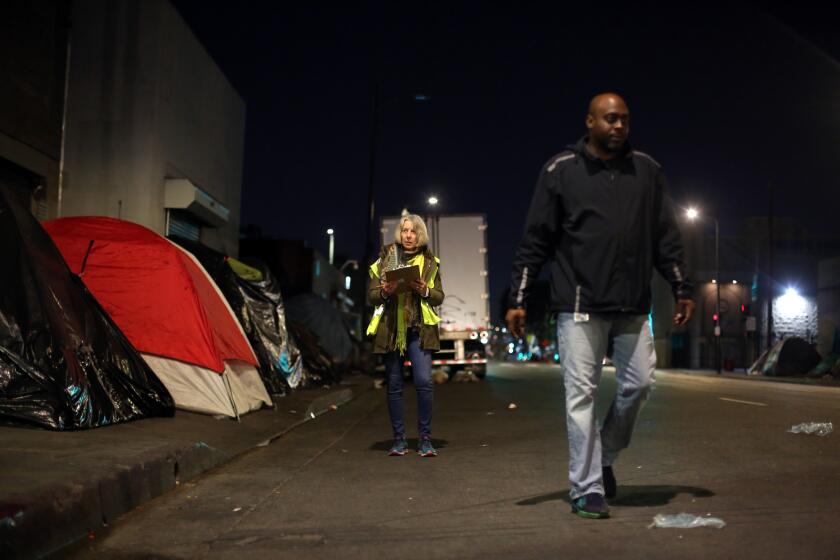County commission backs creating a leadership post on homelessness

- Share via
A commission appointed by the Los Angeles County Board of Supervisors to examine how to improve homeless services is proposing the creation of a new position to oversee all county homeless services.
While not describing the new position as a czar, the eight commissioners said Wednesday they saw the need to have more direct lines of accountability and better coordination for a crisis that involves numerous county departments.
The new leader would report directly to the Board of Supervisors and have the authority to “cut across” agencies such as the county’s departments of Public Social Services, Mental Health and Health Services, said Sarah Dusseault, co-chair of the commission.
“There wasn’t an entity, a coordinated entity, a take-charge entity at the county that can ensure all the spokes of the wheel were moving together,” said Commissioner Wendy Greuel, “And that is on areas of health and substance abuse, diversion, all those things that would help ensure we can keep people off the streets.”
The recommendation was a result of six months of meetings by the task force, dubbed the Blue Ribbon Commission on Homelessness when it was appointed in July. Staff employed by the county sought feedback from county supervisors’ staff, Los Angeles City Council members, business associations, coalitions of faith leaders, officials from cities across the county, and civic groups like the Committee for Greater LA and Hollywood 4WRD.
A new commission on homelessness created by the L.A. County Board of Supervisors is unnecessary. The board already has plenty of studies it could use to come up with new approaches.
The commissioners also proposed the creation of a “local solutions” fund that would direct a share of the Measure H homelessness sales tax dollars approved by voters in 2017 to the county’s smaller cities.
Supervisors Hilda Solis and Kathryn Barger have long pushed for the more direct distribution of the county’s homelessness funds to the smaller cities in Los Angeles County.
Cities are “ground zero and critical partners in our fight against homelessness,” Barger said in a statement about the recommendations. “They know best what local housing solutions will work for their communities and homeless residents.”
In a presentation to the commission, El Monte city manager Alma Martinez described a need for directly investing Measure H funds into cities so they can consistently fund their own homelessness programs.
“We must ensure that [cities] have access to the funding needed to both launch new and continue to fund existing programming for people experiencing homelessness,” Solis, who represents many small cities in the San Gabriel Valley, said in a statement.
Many of the details of the recommendations passed Wednesday, which were mostly broad in scope and short on details, will be finalized in a report the commission will review during their next meeting March 30 before submitting to the supervisors.
The commission had no participation from the city of Los Angeles. Mayor Eric Garcetti and City Council President Nury Martinez declined to nominate four members of the commission, saying the commission’s work would only stall progress to address the homelessness crisis.
Supervisor Janice Hahn said in a statement it was “disappointing” that the city did not participate in the commission, saying it would make “implementing some of these recommendations more difficult.”
It’s up to the discretion of the supervisors to decide what the new county-level homelessness entity will look like or how its leader will be chosen, should they choose to implement the recommendation, Dusseault said.
The future role of the Los Angeles Homeless Services Authority is also unclear.
Los Angeles Homeless Services Authority missed several goals in its contract with L.A. to get people into shelters, housing and treatment, an audit says.
Officials have long agreed on the need for restructuring the top homeless services agency, a joint city-county authority, which has limited powers over the tools that help people get off the streets and into housing. In 2020, LAHSA had already gone through a year-long audit by a Houston consulting firm and internal review process.
The agency’s woes partly stem from the fact that it is saddled by federal compliance and fractured governance with multiple commissions, boards and councils in charge of various and sometimes competing tasks. It also answers to the political leaders of both the city and county while navigating city and county departments as well as activist groups and nonprofits that carry influence over homeless policy.
The commissioners Wednesday unanimously rejected the option to dissolve LAHSA completely but recommended it be “streamlined.”
Their recommendation involved eventually having LAHSA transition away from providing direct services funded by the county — a majority being outreach — and having the new county entity coordinate those services instead, while having the agency focus on its core roles in handling federal homelessness funds, conducting the annual homeless count and managing referrals to homeless housing.
“The goal was, streamline LAHSA so they can provide excellence and data management and be the lead on the rehousing piece,” Dusseault said.
More to Read
Sign up for Essential California
The most important California stories and recommendations in your inbox every morning.
You may occasionally receive promotional content from the Los Angeles Times.













